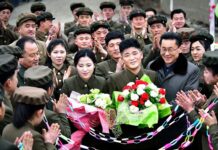This spring has brought a noticeable increase in the number of North Korean factories and enterprises leasing out parcels of farmland to private
individuals, it has emerged.
A source from North Pyongan Province reported the news to
Daily NK on the 21st. She explained, “The trend recently has been towards
factories leasing out parcels of their farmland. On average they agree to divide up production 70/30, but in cases where lessees have already shown the ability to generate good returns on their own private plots it can be as high as 50/50.”
North Korean factories and firms use land given to them by the state to grow supplementary foodstuffs for employees, such as vegetables for use in side dishes like kimchi. Large ones have dedicated units that manage their farmland full-time, while smaller ones do so on an ad hoc basis.
The lease agreements are being concluded according to not
only the capacity of the farmer to generate returns, but also upon which side is to provide inputs such as vinyl coverings and fertilizer, the source went on to reveal. If the majority of the
inputs are to come from the factory then the harvest is likely to be divided 70/30 in favor of the factory.
If the farmer is making the majority of the investment personally, the division can be as high as 50/50.
“Obviously, anyone who has money is going to prefer a 50/50 split, and people who don’t are going to get 70/30,” the source said. “Factories generally like the 50/50 split more because it means they do not to have to concern themselves with the farming process itself.”
Lessees are in some cases able to secure access to farmland via bribery or human networking, but the source emphasized that the ability to generate a good harvest is what usually matters. “We’ve had private farm plots here for the better part of 20 years now,” she pointed out, “so we know very well who has lots of farming experience and who is hard-working.”
Sources explain that people who are officially registered as members of
cooperative farms cannot farm land owned by factories in this way. In general, the ones taking out the leases are either factory workers who know how to farm effectively, or failed traders who have turned to farming other people’s private plots for them.
Importantly, the leasing of land in this way appears to have become
official policy. This marks a shift in approach: although cases of similar deals between factories
and private individuals started to appear at the beginning of the 2000s, these
were illegal which limited their spread. Conversely, the authorities have been focusing heavily on improving the efficiency of the agricultural system for the last 2-3 years, and
instances of land rental are now more widespread than ever before.
In an interview with the pro-North Korea publication Choson
Sinbo last May, Kim Myong Ho, a 52-year old director in the North Korean Ministry of Light
Industry, explained that the government had decided to grant factory and
enterprise managers greater authority in order to improve industrial production.
Authority over land owned by individual factories and
enterprises rests with factory managers, who decree what is grown,
in what quantities, and by whom. Therefore, in the event that managers stipulate that their land is being leased in order to increase production, the leases are acceptable to the state.
“The state directive was that we have to improve production
and the management of state firms,” the source commented. “They don’t mind whether
this is done by farming the land directly or by leasing it to other people to
farm.”



















